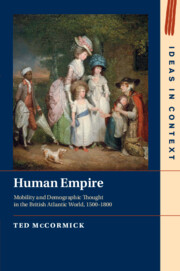Book contents
- Human Empire
- Ideas in Context
- Human Empire
- Copyright page
- Dedication
- Contents
- Acknowledgments
- Introduction Transformations in Demographic Thought
- Chapter 1 Mobility and Mutability in the Early Tudor Body Politic
- Chapter 2 Marginality, Incivility and Degeneration in Elizabethan England and Ireland
- Chapter 3 Beyond the Body Politic: Territory, Population and Colonial Projecting
- Chapter 4 Transmutation, Quantification and the Creation of Political Arithmetic
- Chapter 5 Improving Populations in the Eighteenth Century
- Conclusion Malthus, Demographic Governance and the Limits of Politics
- Afterword
- Bibliography
- Index
Introduction - Transformations in Demographic Thought
Published online by Cambridge University Press: 14 April 2022
- Human Empire
- Ideas in Context
- Human Empire
- Copyright page
- Dedication
- Contents
- Acknowledgments
- Introduction Transformations in Demographic Thought
- Chapter 1 Mobility and Mutability in the Early Tudor Body Politic
- Chapter 2 Marginality, Incivility and Degeneration in Elizabethan England and Ireland
- Chapter 3 Beyond the Body Politic: Territory, Population and Colonial Projecting
- Chapter 4 Transmutation, Quantification and the Creation of Political Arithmetic
- Chapter 5 Improving Populations in the Eighteenth Century
- Conclusion Malthus, Demographic Governance and the Limits of Politics
- Afterword
- Bibliography
- Index
Summary
The introduction states the argument and introduces key concepts, including ideas of multitude and political arithmetic, as well as important distinctions, including that between quantitative and qualitative aspects of demographic thought. It briefly surveys past approaches to the history of population as an idea, paying particular attention to Michel Foucault. It then outlines the book’s episodic approach; explains its geographical and temporal scope (England, Ireland and the British Atlantic, circa 1500 –1800); characterizes the range and types of sources used; and describes its focus on the emergence of population as an object of knowledge and qualitative manipulation (referred to as demographic governance), as well as on questions of the locus and limits of power over population (referred to as demographic agency).
Keywords
- Type
- Chapter
- Information
- Human EmpireMobility and Demographic Thought in the British Atlantic World, 1500–1800, pp. 1 - 24Publisher: Cambridge University PressPrint publication year: 2022

